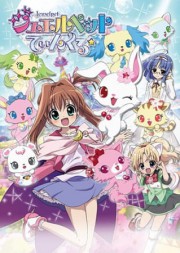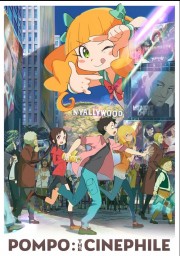Ai Yori Aoshi (TV) Reviews
|
1182
|
| Title(s): |
Ai Yori Aoshi
Ai Yori Aoshi [Azul] (Spanish)
Azul (Spanish)
Bleu Indigo (French)
Bluer Than Indigo
Темнее, чем индиго (Russian)
藍より青し (Japanese)
青出於藍 (Chinese (Taiwan))
쪽빛보다 푸르게 (Korean) |
| Creator: |
Masaharu Amiya
|
| Genres: |
Comedy,
Drama,
Romance,
Slice of Life
|
| Age Group: |
Teenagers (May contain bloody violence, bad language, nudity) |
| Vintage: |
April 10, 2002 |
| Status: |
Completed |
| Summary: |
Kaoru Hanabishi, a college student who lives alone, met a beautiful but bewildered girl dressed in kimono at train station. He volunteered to guide her way to the address she was looking for, which looked like in his neighborhood but turned out to be an empty lot. Not knowing what to do next, Kaoru invited the devastated girl to his apartment and asked for additional clue -- a photo with two children whom Kaoru immediately identified as himself and Aoi Sakuraba, his childhood friend. It turned out that the girl in front of him is Aoi Sakuraba herself, his betrothed fiancée who came all the way to Tokyo to marry him. Her revelation was not only surprising but also reminded the deepest part of Kaoru's memory for why he left the Hanabishi family in the first place. |
|
Reviews
|
A good one
|
Overall Rating
Good
Story: 4
Dialogue: 4
Animation: 4
Entertainment: 4
|
A good one
|
|
10 out of 13 people found this review helpful.
|
|
good
Written by mizul89 on September 17, 2011 at 7:17 AM |
Overall Rating
Good
Story: 4
Dialogue: 4
Animation: 4
Entertainment: 4
|
good
|
|
5 out of 8 people found this review helpful.
|

|
This is how a Romantic Anime should be!
Written by eri8cthow on September 1, 2011 at 4:54 PM |
Overall Rating
Good
Story: 4
Dialogue: 5
Animation: 4
Entertainment: 4
|
Predictability will always be a calling card of the harem romance, as much a part of its makeup as colorful hair, cute girls and awkward situations. However, Ai Yori Aoshi takes this a step further, practically redefining the the concept by stretching it to breaking point. Suffice to say that if you are unable to guess how things will turn out after watching just the first episode of this series, it will be because you set your sights too high and hoped for a surprise, a shock, a bombshell or any kind of diversion from the plot's unwaveringly linear ( read more)
Predictability will always be a calling card of the harem romance, as much a part of its makeup as colorful hair, cute girls and awkward situations. However, Ai Yori Aoshi takes this a step further, practically redefining the the concept by stretching it to breaking point. Suffice to say that if you are unable to guess how things will turn out after watching just the first episode of this series, it will be because you set your sights too high and hoped for a surprise, a shock, a bombshell or any kind of diversion from the plot's unwaveringly linear course.
The anime experiments in sentimentality are equally clumsy and ill-advised. In addition to the aforementioned predictability and the tedious characters, something which I will get onto later, the show ruins most of its emotional scenes with its incessant drive to patronise the viewer by having characters voice their thoughts and feelings in a manner more suited to an infant's puppet show than what is ostensibly a series aimed at relatively mature individuals. In one scene, for example, the heroine Aoi stares wistfully at the clock, then at the empty chair opposite her, then at the full plate of food laid out in front of the empty chair. A few seconds pass before she announces, seemingly to herself "I wonder where Kaoru has got to? He should be home by now" or something equally banal but just as bleeding obvious from the circumstances.
The faces and figures of the characters are their outfits. You can tell that the author is quite familiar with Japanese traditional clothing not only in the terminology (another thing left intact by Tokyopop, thankfully), but in the care taken in drawing the outfits. Especially Aoi's. Every little draped fold is given care and thought, and it really adds a great deal of livelihood to the scenes.
There's very little "action" depicted in this manga's panels. True, a romance is going to have much more dialog than action, but while emotion and drama are well laid out with faces and shading, there's not much presented with action or movement. It's a small weakness, but a noticeable one.
Another thing to be wary of; Ai Yori Aoshi doesn't hide its fanservice. Aoi's breasts are on display for all to see several times throughout the story, and frequently as chapter break pages. I'll be true to my testosterone and admit that Fumizuki does a good job drawing the curvy soft parts of a woman, but blatant fanservice is blatant fanservice.
The backgrounds are also very beautiful, consisting of soft and almost dream-like artwork of the most serene proportions. While the sharp and vivid characters clash somewhat with the more subdued backgrounds, this isn't enough to be too distracting. The animation of the series is also done nicely with fluid movements and good camera work that allow foreground objects to blend in nicely with the background.
It's crucial task is delegated to the many failed attempts at comedy, sentiment or anything which would have given the anime some measure of personality. Although there are a couple of rowdy characters in the mix, Ai Yori Aoshi's humor is executed with all the enthusiasm and wit of a chartered accountant with a gun pointed at his head. The only real way to tell that a scene was supposed to be funny is the occasional sweat drops which materialise on the back of characters' heads. If this show had canned laughter, I probably wouldn't be sane enough to write this.
Ai Yori Aoshi~ is everything that I hoped the original series would be, a touching, bittersweet drama with just enough comedy to keep the mood light. A worthy closure to a fine series. ( show less)
|
|
7 out of 8 people found this review helpful.
|

|
check this out..
|
Overall Rating
Good
Story: 4
Dialogue: 4
Animation: 4
Entertainment: 4
|
most of you are saying that this anime is english dubbed..yea i know it is..BUT if you are using VLC.. you can switch it to a japanese dubbed..yep! it is dual audio peepz!!! haven't watch the anime though..will make a review again! good day to all...
|
|
0 out of 6 people found this review helpful.
|
|
Great to watch while winding down
Written by kazekuma on October 21, 2010 at 6:53 PM |
Overall Rating
Good
Story: 4
Dialogue: 4
Animation: 4
Entertainment: 4
|
At first it seems like a romantic comedy with your typical harem/shonen plot. Aside from the fan service and comedy there is a more serious tone in the plot.
The anime is really easy to follow and very enjoyable.
|
|
12 out of 12 people found this review helpful.
|
|
Popular Anime
Top Contributors
| Top Contributors |
|
| satoshiandkinki |
71,235 files |
|
| Nanilist |
56,826 files |
|
| smf |
26,294 files |
|
| rension23 |
15,722 files |
|
|
10,792 files |
|
| Little_Wolf-18 |
9,112 files |
|
| Numisma |
4,054 files |
|
| Zenixus |
4,028 files |
|
| manalosana21 |
3,740 files |
|
| TextMakeKeke |
3,480 files |
Recent Reviews
 |
Good Anime..........enjoyed a lot
|
|
 |
Very nice and cute anime. It helped me bring happiness to my heart. Thank you for providing us with the translation files.
|
|
 |
Excellent
|
|
 |
Very Good
|
|
 |
God mode
|
|
 |
Perfect
|
|
 |
Ugh. "Evil is good" trope making its way into yet another anime. Oh, a nun saying that as long as the demon and the others...
|
|
 |
Excellent
|
|
 |
I have uploaded and yet again, cant download anything, so what's the point?
|
|
 |
Can somebody here explain why I upload something, yet people cant download anything even after showing it as success?
|
|